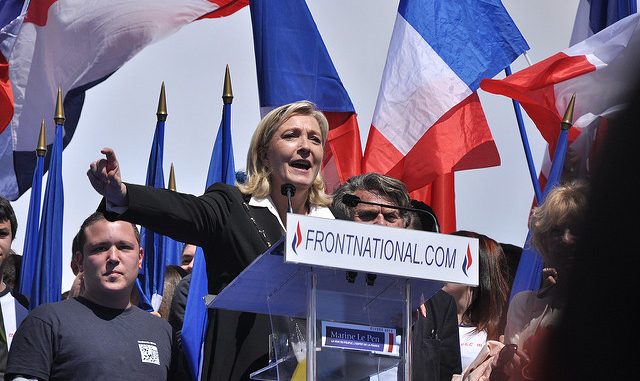
In France, more than anywhere else in Europe, the history and memory of fascism is bound up with the history and memory of empire. As escalating corruption scandals raise the specter of a far-right victory in the French presidential elections scheduled for May, recognizing these ties is increasingly urgent. The colonial past, especially in Algeria, has figured prominently in the campaign and continues to shape both French fascism and efforts to contain it.
The roots of contemporary French fascism lie in the colonies.1 The Algerian War of Independence (1954-62) spurred the revival ofthe far right from its postwar disgrace and gave birth to the leading far-right party, the National Front (FN). As a young man, the FN’s founder and long-time leader, Jean-Marie Le Pen, volunteered to fight against decolonization in both Indochina and Algeria. The same desire to preserve the French empire and overcome the spirit of “defeatism”—a reference to France’s defeat by the Germans in 1940 and then by the Viet Minh in 1954—inspired his first forays into politics. In the last years of the Algerian War, he founded the National Fighting Front and the National Front for French Algeria, both devoted to thwarting Algerian independence. After the war, Le Pen headed up the 1965 presidential campaign of Jean Louis Tixier Vignancourt, a far-right supporter of Vichy leader Marshal Philippe Pétain and pro-French-Algeria militant. The FN itself, founded in 1972, united a disparate collection of like-minded groups dominated by Pétainists and opponents of decolonization.

The FN made its electoral breakout just as a series of public scandals began to break French collective amnesia about the Algerian War in the early 1980s. The party burst onto the scene with an unexpectedly robust showing in municipal by-elections in 1983 and its first significant national score (11 percent) in 1984. These initial victories came in Paris and the nearby town of Dreux, but the party’s strongest bastions were and continue to be in southern departments where large numbers of former Algerian colonists, known as pieds-noirs, settled after decolonization.
Despite these successes, Jean-Marie Le Pen’s ugly racist, colonialist language remained anathema to large segments of the electorate. When he unexpectedly advanced to the second, run-off round of the presidential elections in 2002, millions took to the streets to denounce him and then voted overwhelmingly for the conservative incumbent in a united front against “fascism.” But the FN has nonetheless become a fixture of local and regional politics in many parts of France since the mid-1980s. The party now takes a steady 15 to 20 percent of the vote nation-wide and has won control of a number of municipalities and regional governments, especially in the south.
This normalization has been aided by Le Pen’s retirement as party leader in 2011. His successor, his daughter Marine, has pursued a careful strategy of “de-demonization” (dédiabolisation). Without altering the party’s basic principles, she has softened its rhetoric and sought to moderate its public image. She eschews her father’s constant invocations of World War II and Algeria, and has quite successfully recast the FN’s cultural racism as a defense of French republican secularism. By now, however, her father’s ideas have become far less offensive to French sensibilities. The mainstream conservative party responded to the shock of the 2002 présidentielles by openly embracing much of the FN’s anti-immigrant, Islamophobic attitude. Over the last decade, a growing sense of crisis triggered by the faltering economy, rising social unrest, and Islamist terrorism has only widened its appeal.
The last conservative president, Nicolas Sarkozy, adopted strongly frontiste language and advocated immigration policies closely modeled on those of the FN. In 2005 and 2007, Sarkozy proposed immigration quotas based on “regions of origin” (code for race and ethnicity, since state collection of data on racial or ethnic identity is illegal). In practice, these would have revived early twentieth-century policies designed to favor immigration from Europe and to limit the migration of non-whites from French colonial territories.
Both proposals were ultimately withdrawn based on concerns about their constitutionality, but now the quotas have been resurrected by the current conservative presidential candidate, Sarkozy’s former prime minister François Fillon. In December, Fillon, who was widely expected to face Marine Le Pen in the second round this May, announced a tough new immigration plan that closely resembles longstanding FN positions. In addition to drastic reductions to overall immigration numbers, he proposes limiting foreigners’ access to social security benefits and, most significantly, quotas based on potential immigrants’ “capacity for welcome and integration in France.” This dog-whistle phrase unambiguously invokes colonial-era stereotypes of Muslims as “unassimilable” and Islam as incompatible with French republican values. This was clear in a November 2016 immigration speech, in which Fillon implied that all Muslims sympathize with Islamism, an ideology he deemed “a totalitarianism like the Nazis.” By contrast, he declared, Catholics, Protestants, and Jews “do not denounce the values of the Republic.”
The anticipated Fillon-Le Pen faceoff has been derailed in recent weeks by escalating corruption scandals surrounding both candidates. Although he has so far refused to withdraw from the campaign, Fillon is now facing indictment for misuse of public funds after revelations that he paid his wife nearly a million euros for a fake “parliamentary assistant” position. Marine Le Pen is being investigated for similar improprieties, although accusations that she paid FN party operatives for “fictional jobs” in her European Parliament office seem to have done less damage to her public support. The most recent opinion polls put her in first place, four points ahead of the man who has moved into second place, the centrist technocrat Emmanuel Macron.
But despite these shifts in the electoral landscape, Algeria remains central to the politics surrounding fascism in France. To consolidate his new status as the leading anti-fascist candidate, Macron used a visit to Algiers last month to denounce French colonization in Algeria as a “crime against humanity” and a “barbarity” for which France ought to apologize. The response from the French right was immediate and outraged. Marine Le Pen herself accused Macron of committing a crime against his own country, and he was quickly forced to backpedal his earlier comments. At rally in Toulon less than a week after returning from Algiers, Macron apologized for any offense to Algerian repatriates, while dozens of pied-noir and FN demonstrators chanted “Macron, treason!” outside the meeting hall. However the turbulent presidential campaign ultimately concludes, Macron’s concession on the Algeria question suggests that even if someone does manage to defeat Le Pen in May, FN-fueled neocolonialism will continue to permeate French political life.
Jennifer Sessions is Associate Professor of French History at University of Iowa
Notes
- I am putting aside the definitional issues that have preoccupied specialists of the 1930s. I will use “fascist” here as a shorthand for the contemporary far right. See James MacDougall, “No, this isn’t the 1930s—but yes, this is fascism,” The Conversation, 16 November 2016, http://www.theconversation.com/no-this-isnt-the-1930s-but-yes-this-is-fascism-68867/.


Leave a Reply